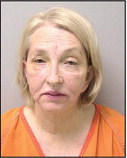Suspect bound over for trial in 2006 Unity homicide case


For seven hours on Oct. 24, two detectives from the Marathon County Sheriff’s Department aggressively questioned suspect Cindy Schulz-Juedes about the murder of her husband 13 y...
